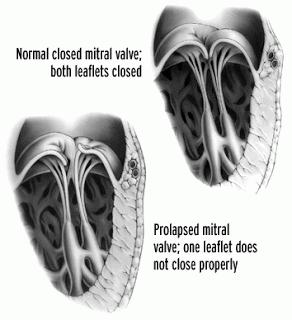
Mitral valve prolapse (MVP) may well be the most common problem with the heart valves. This condition may be present in as many as 5% of the general population. Women are affected more often than men.
Recall that the mitral valve sits between the left atrium and the left ventricle, the main pumping chamber in the heart. And remember that the mitral valve closes while the left ventricle contracts, allowing only one pathway for blood to exit the heart--through the aortic valve and into the aorta.
MVP is a problem with the valve closing properly. The mitral valve consists of 2 leaflets--an anteior (front) and posterior (back) leaflet. The diagram above shows the normal situation as well as the prolapse situation, where (in this case) one of the leaflets does not close properly.
There are several potential causes, including rheumatic fever, inherited conditions such as Marfan's syndrome, infection (endocarditis) of the heart and valves, and as a consequence of coronary artery disease and heart attack. But the most common cause is simply wear and tear, a problem that we call degenerative disease of the valve.
Symptoms may include chest pain, fatigue, and palpitations. Importantly for athletes, the chest pain is most often unrelated to activity.
Patients with MVP often have a classic sound--a mid- to late systolic click--that can be heard with the stethoscope. Nonetheless, this condition is most often identified by an echocardiogram that was obtained to sort out the cause of a patient's symptoms. The ultrasound pictures show the improper closure of the mitral valve and may show any associated problems such as leaking (regurgitation) of the valve.
We generally think of MVP as a benign condition--that is, one that has few harmful effects other than the symptoms.
Medical treatment with beta-blockers--medications that slow the heart rate and reduce the blood pressure--may alleviate the symptoms. Current guidelines suggest that individuals with mitral valve prolapse do not need to take antibiotics to prevent infections (endocarditis) of the heart and heart valves.
If regurgitation becomes moderate to severe, because of continued degeneration of the valve over time, surgical repair or replacement of the valve may be necessary.
Recommendations for Athletes
Consensus recommendations for athletes come from the Proceedings of the 36th Bethesda Conference.
Athletes with MVP can participate fully if they don't have: a history of syncope (blacking out); repetitive arrhythmias; severe regurgitation of the valve; reduced heart function; a history of stroke or transient ischemic attack (TIA); or a family history of sudden death related to MVP. Athletes with any of those additional problems should receive further evaluation and should participate only in low-intensity sports.
